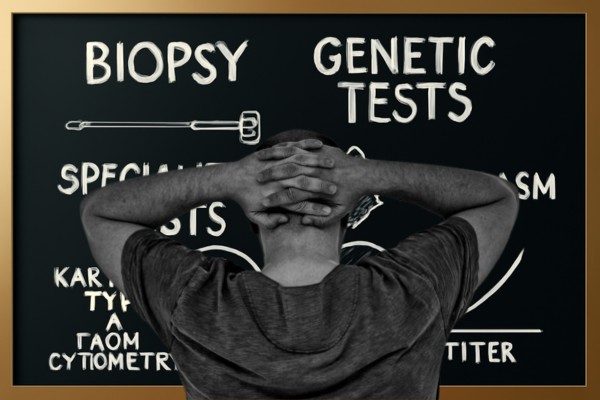Biopsy and genetic tests are highly advanced diagnostic techniques used to detect cancers, genetic disorders, and certain chronic conditions. They are usually recommended by doctors when blood, urine, and imaging tests fail to provide a clear diagnosis. Biopsy and genetic tests give information about cells, genes, and how the body is working, which helps doctors decide the best treatment.
Table of Contents
1. Tissue Biopsy
A tissue biopsy is a type of biopsy and genetic test in which a doctor removes a small piece of tissue for microscopic examination. In this study doctors check for the presence of cancer cells and gene-level infections. It helps in confirming cancers, infections, and inflammatory conditions. Depending on the site and method, there are different types of biopsies:
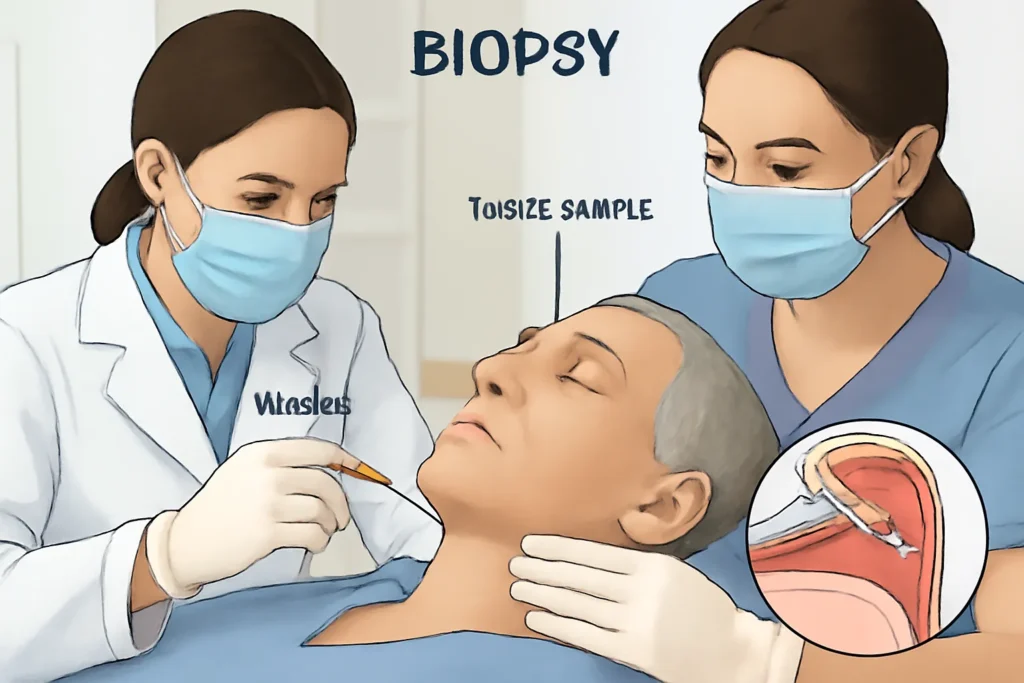
Type of Biopsy | Common Sites | Purpose |
| Core Needle Biopsy | Liver, Kidney, Breast, Lymph Node | Detect tumors, infections, inflammation |
| Excisional Biopsy | Skin, Lymph Node | Remove & analyze entire lesion |
| Incisional Biopsy | Tumor masses | Sample part of lesion for diagnosis |
• Preparation: Local or general anesthesia
• Report time: 3–7 days
• Cost: ₹2,000–₹2,000
2. FNAC (Fine Needle Aspiration Cytology)
FNAC is a rapid and minimally invasive test under the biopsy and genetic tests category. In which a very thin, hollow needle is inserted into the area where the sample is to be taken, and suction is applied to collect a small sample of cells. It is commonly used for thyroid, breast, and lymph node swellings.
• Purpose: Detects infection, cysts, or cancer cells
• Report time: Same day – 3 days
• Cost: ₹1,000 – ₹2,500
3. Bone Marrow Aspiration & Biopsy
Bone marrow is a spongy tissue inside the bone that is responsible for making the blood cells. They are critical for diagnosing leukemia, lymphoma, anemia, and platelet disorders. This test is a part of advanced biopsy and genetic tests. In a bone marrow aspiration sample, it is a liquid from bone marrow, whereas in a bone marrow biopsy, the sample is a solid core of bone marrow tissue.
| Parameter | Normal Findings |
| Cellular Composition | Balanced myeloid & erythroid cells |
| Megakaryocytes | Adequate number |
| Fibrosis | Absent |
• Cost: ₹4,000 – ₹8,000
4. Pap Smear (Cervical Screening)
The Pap smear is an important screening test used to detect precancerous changes and cervical cancer in women. It is recommended for all sexually active women aged 21–65 years. It is a very effective test because it can detect cervical cancer early when it is highly treatable. This test is performed alongside other biopsy and genetic tests in comprehensive cancer detection programs.
• Normal Result: Negative for intraepithelial lesion or malignancy
• Frequency: Every 3 years
• Cost: ₹500 – ₹1,000
5. Genetic Testing
This test is a key part of biopsy and genetic tests. That studies our DNA, chromosomes, and genes to detect any type of mutation that may be harmful to our health.
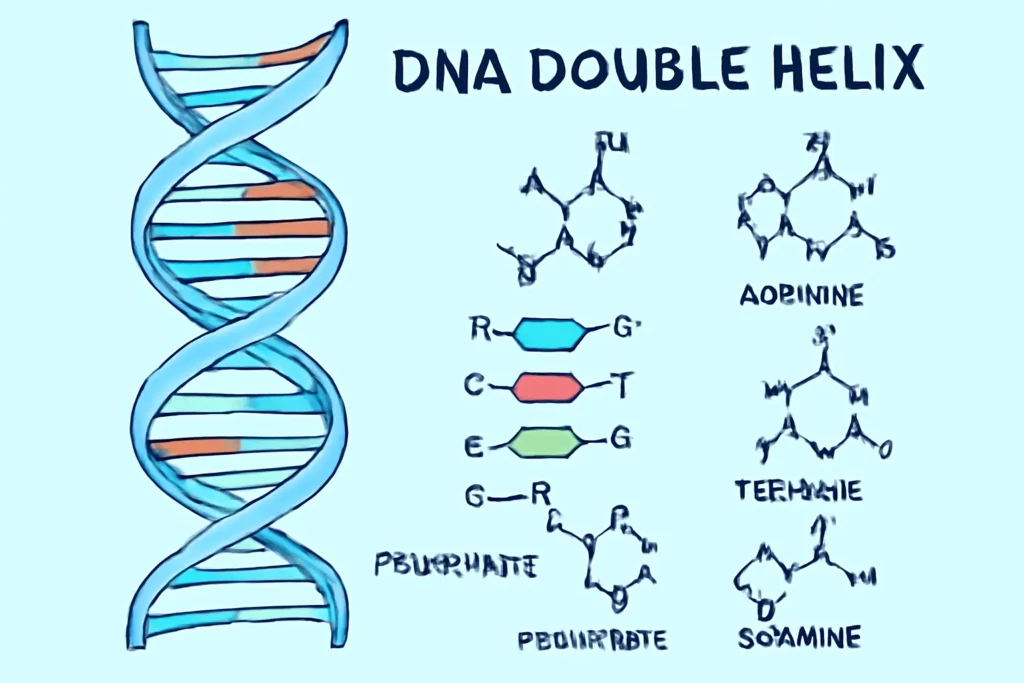
| Test Type | Purpose |
| DNA & Chromosome Analysis | Detects genetic syndromes like Down syndrome, Turner’s |
| BRCA1/2 Mutation Testing | Identifies breast & ovarian cancer risk |
| Carrier Screening | Checks if parents carry genetic mutations |
| Whole Exome/Genome Sequencing | Comprehensive genetic evaluation |
• Report time: 2–4 weeks
• Cost: ₹5,000–₹50,000
6. Newborn Screening Panels
Newborn screening panels are the part of biopsy and genetic tests that are done some time after a baby’s birth to avoid serious but treatable conditions. The goal is to detect these conditions early, before symptoms appear, so treatment can start quickly and can prevent future health issues.
How It’s Done
Heart Screening—By measuring oxygen levels and detecting critical heart defects.
Blood Test—A few drops of blood are taken from the baby’s heel within 24–72 hours of birth.
Hearing Test—Light sounds are played into the baby’s ears to check hearing ability.
• Conditions Tested: PKU, Congenital Hypothyroidism, Sickle Cell Anemia, G6PD Deficiency
• Sample: Heel-prick blood spot
• Cost: ₹1,500 – ₹3,000
7. Drug Level Monitoring
This medical test is done when a drug is harmful in high doses and does not show any effect in low doses. This tells us how much of the drug is reaching the blood and whether that dosage is correct or not. This helps us to know if the medicine is working properly or not, and we can also avoid toxicity and find the right dosage through its practice and spirituality.
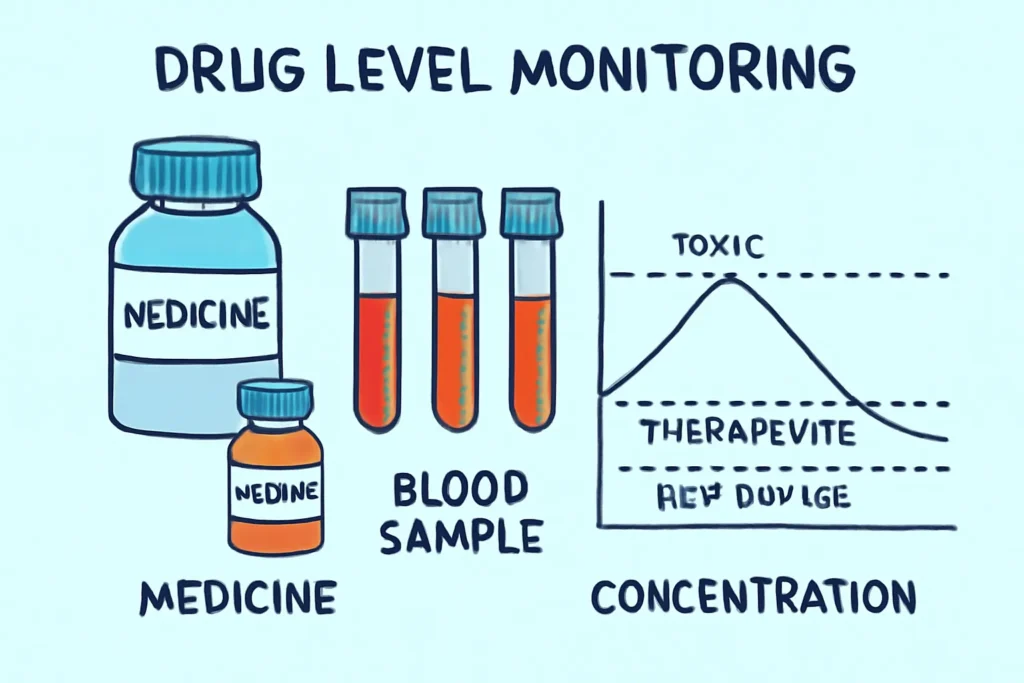
| Drug | Therapeutic Range |
| Lithium | 0.6 – 1.2 mEq/L |
| Phenytoin | 10 – 20 µg/mL |
| Valproic Acid | 10–20 µg/mL |
• Cost: ₹800 – ₹2,000 per drug
8. Flow Cytometry
Flow cytometry is a very modern and powerful test used to analyze cell types in blood, bone marrow, or tissue. It is essential in diagnosing leukemias, lymphomas, and immune disorders. This test is very accurate and can analyze thousands of cells every second. A high-tech analysis is often paired with biopsy and genetic tests. It can detect HIV/AIDS and blood cancer.
• Cost: ₹3,000 – ₹7,000
9. Immunofixation Electrophoresis
This test, when combined with biopsy and genetic tests, identifies abnormal antibodies (proteins) in the blood or urine and is commonly used to detect multiple myeloma and plasma cell disorder.
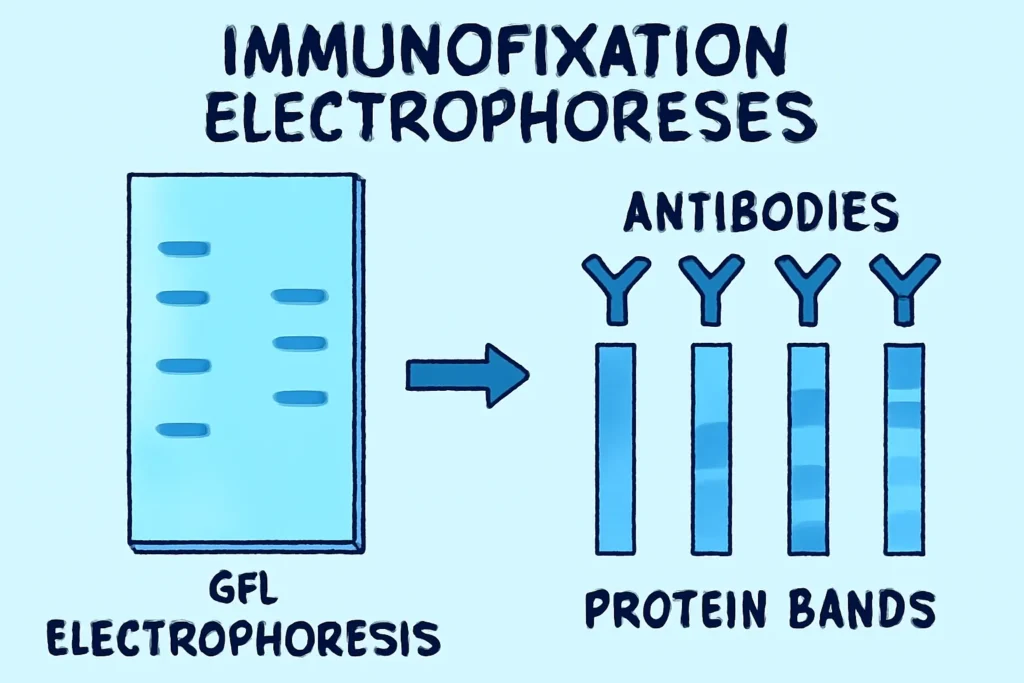
• Report time: 3–5 days • Cost: ₹2,500 – ₹5,000
Key Points
• Biopsy and genetic tests are not first-line diagnostic tests.
• Most biopsy and genetic tests are only recommended by a specialist.
• Tissue biopsy and genetic tests need advanced labs.
• Results must be interpreted by a pathologist, oncologist, or geneticist.
• Early detection through biopsy and genetic tests can significantly improve treatment outcomes.
💡💡💡 Looking for some more medical tests? You can also read our Medical Tests—Complete A to Z Guide (With 100+ Tests
Does a biopsy hurt?
👉 Most biopsies are done under local anesthesia.
Are genetic tests 100% accurate?
👉 They are highly accurate.
Are these tests covered under insurance?
👉 It depends upon your policy.
How much do these tests cost in India?
👉 Costs range from 1000 to 10000 INR
Who should undergo genetic testing?
👉 Individuals with a family history of genetic diseases or cancers should consider it after consulting a genetic counselor.
- Neonatal Disorders: Silent Killers Every Parent Must Know About - September 8, 2025
- COPD Life Expectancy by Stage: What to Expect and How to Improve Your Future. - September 5, 2025
- Chronic Obstructive Pulmonary Disease (COPD): 3.5 million deaths in 2021. - September 3, 2025

